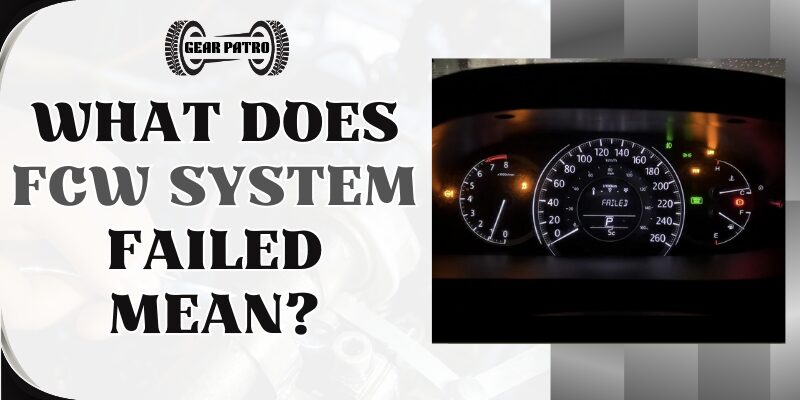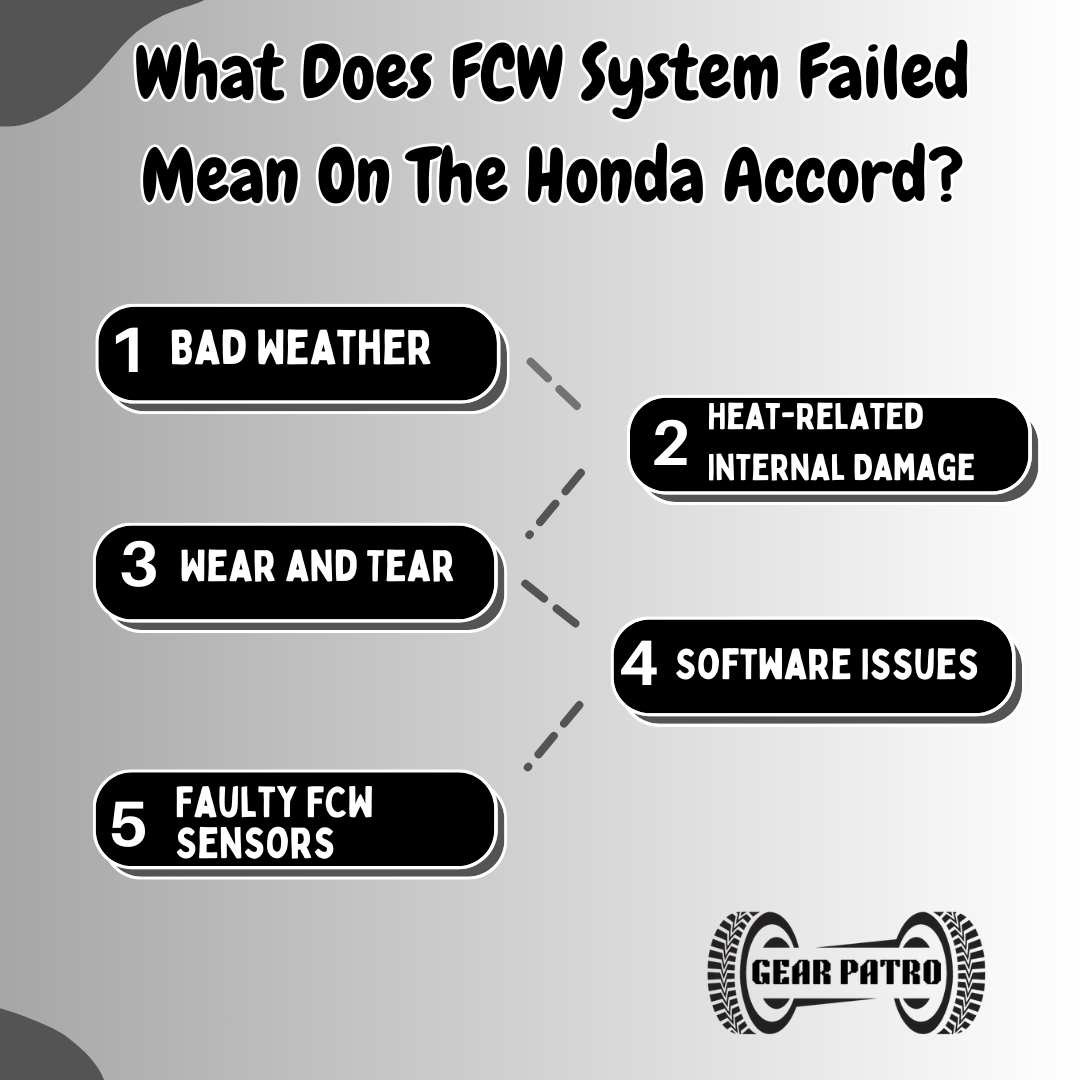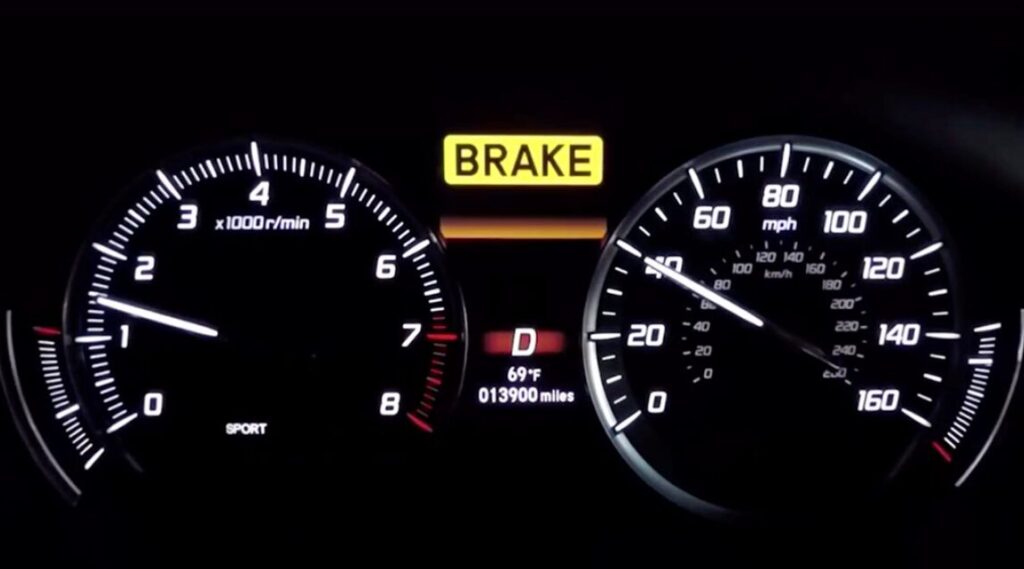Have you installed a forward-collision warning (FCW) system on your vehicle? Many vehicle models now come standard with driver assist systems, which have become increasingly common among auto manufacturers.

In the past few years, FCW has been performing quite well. The Insurance Institute for Highway Safety (IIHS) studied the effect of an FCW system on rear-end collisions and found it could reduce them by 27 percent. Nonetheless, the FCW system is not perfect, and you may discover that it has failed if you buy a used vehicle. In such a case, it is important to identify what caused the problem and take the necessary corrective steps to resolve it.
Summary
- When a forward collision warning system detects an obstacle blocking the path of your vehicle, it will alert the driver.
- It means that perhaps one or more components of the FCW system are malfunctioning if your FCW system fails.
- You can sometimes have a problem with your FCW system even if you have no problems with your vehicle. Having a FCW system that is not working properly may be due to bad weather conditions.
What Does FCW System Failed Mean?
FCW no longer works, which indicates a problem. There has been a failure of one or more system components, so the system must be repaired or replaced.
The dashboard or another highly visible location is typically equipped with a warning light for FCW systems. An illumination of the warning light indicates something is wrong with the FCW.
Here is an example of a failed FCW system on a Honda Accord to get a better idea of what it entails.
What Does FCW System Failed Mean On The Honda Accord?

A part of Honda Sensing’s advanced driver assistance system (ADAS), the Honda Sensing suite includes a variety of safety features. This vehicle has an integrated FCW system that uses a distributed sensor network to collect information about the road.
Cameras, lasers, radar, or a combination of two or all three sensors can be included in the FCW, depending on the vehicle model & iteration.
In the event that a forward-collision warning sensor is not functioning, the system may not operate as effectively. There is a possibility that all sensors could fail at the same time, leaving the FCW system blind.
Bad Weather
If you live in a state with severe weather, such as thick fog, torrential rain, and heavy snowfall, do you have to deal with these conditions a lot? There is a possibility that foul weather can interfere with the operation of FCW sensors. It is possible for the weather to either deceive an FCW sensor into reporting a nonexistent collision hazard or fail to detect a real obstacle, depending on the scenario.
Heat-Related Internal Damage
An optimal range of temperature is required for FCW sensors. The internals of these devices will overheat if they get too hot, which will cause components to burn out or melt. The damage caused by heat can result in a malfunction or failure of an FCW sensor.
In Honda Accords, the cooling system is usually responsible for heat damage to FCW sensors. Radiators on other vehicles vent heat through the front grille, so the Accord is no exception.
It is not uncommon for the heat vented from the radiator to reach some of the FCW sensors on the front end of the vehicle, and as a result, the sensors’ internal temperatures can be elevated to excessive levels. There is a risk of serious damage to sensors if they are overheated.
Honda Accord FCW system failures could also be caused by the following factors:
Wear and Tear
The use of a vehicle and exposure to the elements eventually wear down the parts and components of the vehicle. As the FCW system’s eyes and ears wear out, a number of sensors are exposed to wear as well. The effectiveness of FCW sensors decreases as they age. You might even have to replace it before the expected end of its useful life.
By performing regular inspections, you can detect wear on one or more FCW sensors before problems arise.
Software Issues
A computer running software controls the Honda Accord FCW system. The FCW may occasionally operate erratically when the software develops a bug that requires a patch to be installed. Software for the FCW may also need to be updated if it is not up to date.
Faulty FCW Sensors
There are dozens of sensors in Honda Sensing, providing readings for the system. There are many types of FCW systems available, depending on factors such as the model and year of the vehicle. For example, the FCW system can be equipped with cameras, lasers, radar, or a combination of those.
Many reasons can contribute to the failure of FCW sensors. Previously, we discussed how overheating and general wear and tear can harm a sensor. The presence of moisture and grounding issues, as well as wiring issues, may pose other problems.
What Is The FCW System?
Most new vehicles are equipped with the forward-collision warning (FCW) system, also known as forward collision warning. When you see this indicator, it warns you that you could hit an obstacle, usually another vehicle in front of you.

In order to use FCW systems on their vehicles, manufacturers developed proprietary systems. Audi bundles its Pre Sense package with FCW while Honda offers it in conjunction with Honda Sensing. Mercedes-Benz designed Active Brake Assist with its FCW and Automatic Emergency Braking (AEB) systems.
How Does FCW Work?
By using FCW, your vehicle can determine how far obstacles are from the front of its vehicle and what their location is. As well as your driving speed, it also considers the distance you’re traveling. You will be alerted of an impending collision if the FCW calculates you will crash into an obstacle.
FCW systems are integrated into some vehicle’s automatic emergency braking systems. In contrast, standalone FCWs require the driver to hit the brakes in response to a warning of an imminent collision, and are therefore not capable of automatically slowing or stopping the vehicle without driver input.
FCW System Types
As far as their capabilities are concerned, FCW systems can be categorized into two types. By using cameras, lasers, and radar scanners, the forward-collision warning system detects other vehicles.
A FCW of this type, however, can only recognize vehicles that are similar to its own. Because pedestrians aren’t recognized as obstacles, the system won’t notify you when someone crosses the road.
Another type of FCW is one that detects pedestrians. A pedestrian will be detected and alerted if it is present in addition to searching for vehicles. In addition to identifying cyclists, some FCW systems can also detect sufficiently large animals such as horses.
It is possible that FCW systems have different additional capabilities. There are some examples of this system that work within the low speed limits mandated for urban roads, while others are able to work at faster speeds. Other FCW systems include rear-facing sensors that warn you about incoming rear-end collisions as well, in addition to scanning the area ahead of the vehicle.
Whenever you are unsure about a vehicle’s FCW capabilities, consult your owner’s manual. Your safety, that of your passengers, and that of other drivers and pedestrians will be enhanced if you know what the FCW can and cannot do.
How To Fix A Failed FCW System
A shop certified in ADAS calibration and repair is the only place to take your car if you get an FCW system failed message.
FCW calibration will be performed at both the beginning and end of the repair process by the mechanics. During the repair process, the technicians will also update the software and reset the system if necessary.
If the repair shop is able to handle FCW system repair and maintenance, ask if they have the necessary equipment and expertise. Such services aren’t available in most shops because the process takes a lot of space and equipment that is prohibitively expensive.
